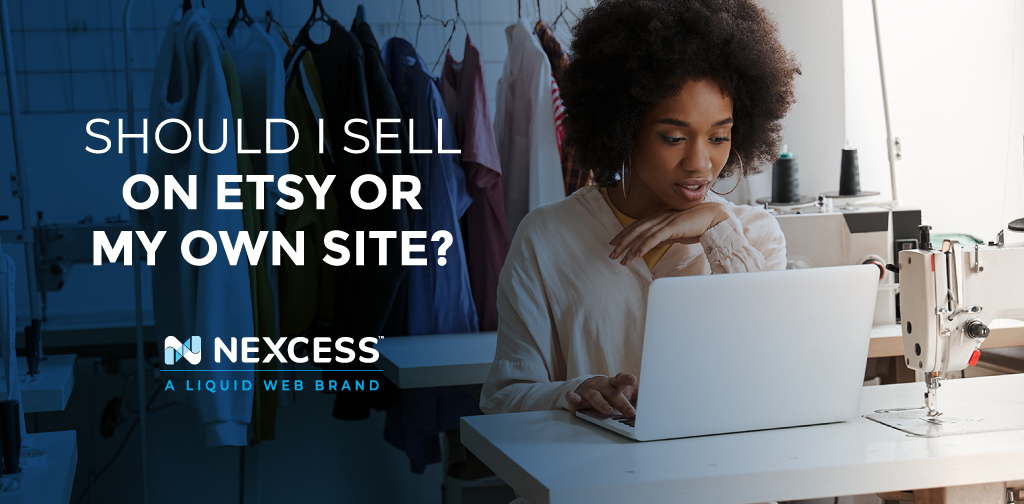If you’re a talented crafter or vintage reseller, Etsy may seem like the only option for making an ecommerce store. An Etsy shop is easy to set up, and you don’t need to know anything about building a website. It would seem like a no-brainer. But then you ask yourself, “Should I sell on Etsy or my own site?”
The ease of setting up your ecommerce store may not be the only factor to consider. Earlier this year, Etsy raised its transaction fees for sellers to 6.5%. And while Etsy’s CEO claims it was to improve marketing and the tools they provide to their sellers, the sellers organized a strike in protest.
Before you decide if you should sell on Etsy or your own site, consider the benefits and limitations of selling on Etsy, and compare them to selling from your own website.
Selling on Etsy
Etsy is a well-known online marketplace for unique handmade and vintage items. Etsy offers brand recognition and other benefits.
Benefits of Selling on Etsy
For sellers looking to hit the ground running without worrying about building their own website, Etsy offers a quick and easy setup. And the setup itself is free, so there’s no web hosting fees or web design costs. Plus, the Etsy platform gives sellers tools to help track their statistics, enabling sellers to better understand and track their sales data.
For new sellers, Etsy can be a great place to build community. Not only does Etsy already have an established audience that is actively searching for products to buy, but sellers help each other and even forge marketing partnerships. For sellers who aren’t sure if their products are viable yet, Etsy is a great place to learn more about ecommerce, as well as a place to refine their process and how they market their work.
Sell your products online, worry-free
Officially recommended by WooCommerce, our hosting is made for online businesses like yours
Limitations of Selling on Etsy
Unfortunately, there are also limitations to the Etsy platform. Even though it can be a great place to build community, millions of Etsy sellers exist, which means tons of competition for your shop. It’s almost impossible to stand out against the more established sellers. There’s also the threat of copycats since Etsy doesn’t stop other sellers from stealing your designs.
When you consider that Etsy now allows dropshipping — a way to fulfill orders where sellers don’t actually create or house the products — there are concerns that Etsy allows sellers to circumvent the handmade, custom-made, or vintage prerequisite for selling on the platform.
And at the end of the day, Etsy isn’t an ideal platform for building a brand. Your Etsy shop is limited in how much you can brand it, meaning your customers won’t remember you and are unlikely to remain loyal. There’s no easy way to get your customers to sign up for your email list through your Etsy shop, so you can only really contact them through Etsy’s messaging system.
Even though it’s cheap to set up a store, Etsy charges transaction fees, many of which are higher than most common payment processor fees. Sellers pay a flat rate of 20 cents per listing, 6.5% of the total payment collection, and a 25-cent fee when the sale processes through Etsy’s Direct Checkout.
If that weren’t enough, Etsy sellers don’t actually own their stores. So, if Etsy decided to close your shop at any time, you’d lose the entire store and all your reviews and data. So when someone asks if they should sell on Etsy or their own website, what they’re really asking is, “Is Etsy worth the risk?”
Selling on Your Own Site
With all those limitations, it’s good that Etsy isn’t the only option for selling online, especially if you’ve done the “Etsy vs. my own website” cost benefit analysis. Selling on your own website may have a bigger learning curve, but the benefits far outweigh the obstacles.
Selling on your own site allows you to build customer loyalty. You can design the look and feel of your website and use forms to collect customer emails to reach out when you have a new product. This access allows you to create more targeted marketing campaigns because you can collect customer data and create ads and email sequences based on that information.
And even though your site is one of many on the internet, your customers won’t be distracted by sellers with similar products or product copycats because you won’t be sharing a site with other sellers. Since you own the site, you get to determine the rules you operate by. You won’t be subject to arbitrary fee increases or the high fees Etsy charges on sold items. Most payment processors tend to charge smaller fees than Etsy.
When you build your store, you’re in charge of the content you put on the site, the product descriptions, the design of the store, and the search engine optimization. Selling on your own site puts the power back in your hands.
WooCommerce is an Easy Option
If you’re ready to build your own ecommerce store and avoid Etsy’s fees and lack of transparency, Managed WooCommerce is an easy way to create your own online store with all the best features already included.
Learn more about Managed WooCommerce and how you can quickly and easily build your own online store.
Don’t let the fear of not knowing how to create an ecommerce store hold you back. And don’t get stuck selling your products on a platform with arbitrary fees and no customer loyalty.

